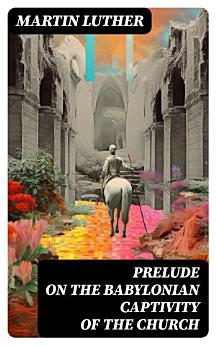Prelude on the Babylonian Captivity of the Church: Theological Treatise on Sacraments of the Catholic Church
Martin Luther
Dec 2023 · DigiCat
Ebook
105
Pages
family_home
Eligible
info
reportRatings and reviews aren’t verified Learn More
About this ebook
In "Prelude on the Babylonian Captivity of the Church," Martin Luther presents a critical examination of the sacraments and the church's practices in the early 16th century, arguing against the prevailing Catholic doctrine. Luther's prose is incisive yet accessible, infused with theological passion and a reformative zeal that challenges the institutional authority of the Church. He draws extensively on biblical scripture, employing a historical context that underscores the tension between ecclesiastical tradition and scripture-based faith, offering profound insights into the socio-religious climate of his time. Martin Luther, a seminal figure in the Protestant Reformation, was deeply influenced by his experiences as a monk and scholar. His theological inquiries were often rooted in the quest for personal salvation and a desire to reform the Church from within. This work builds upon his previous writings, reflecting the growing disillusionment with corrupt practices and the yearning for a return to scriptural fidelity, thus marking a pivotal moment in religious thought. This enlightening treatise is highly recommended for scholars and lay readers alike who seek to understand the foundations of Protestant thought. Luther's courageous and innovative arguments not only shaped the Reformation but also continue to resonate in contemporary discussions about faith and authority.
About the author
Martin Luther (1483-1546) was a seminal figure in the Protestant Reformation, whose writings and actions helped to radically change the course of Western and Christian history. Luther's theological insights and confrontational works, such as his 'Prelude on the Babylonian Captivity of the Church', provided a cogent critique of the Roman Catholic Church's practices and the overarching ecclesiastical authority of his time. Trained as an Augustinian monk and a scholar, Luther was initially motivated by a deep desire to find spiritual peace and certainty of salvation. His intellectual journey led him to question the practice of indulgences, eventually resulting in his famous Ninety-Five Theses, which would incite a religious reformation. Luther's contributions to theology reflect his profound understanding of the Bible and articulate a theology centered on 'justification by faith alone'. Beyond theology, Luther's translation of the New Testament into German democratized access to the scriptures, allowing laypeople to engage with the Bible directly. His defiant stand against what he deemed as ecclesiastical corruption and his emphasis on a personal, scripture-based faith had profound implications for theology, politics, and society. Luther's literary style was marked by a bold and polemical tone, which can be seen in works like the 'Babylonian Captivity', where he metaphorically equates the Papal Church with ancient Babylon, holding God's people captive. Luther's legacy is preserved through his voluminous writings and the Lutheran denomination, which bears his name. His radical ideas about church authority, scripture, and the priesthood of all believers have left an indelible mark on Christian doctrine and practice.
Rate this ebook
Tell us what you think.
Reading information
Smartphones and tablets
Install the Google Play Books app for Android and iPad/iPhone. It syncs automatically with your account and allows you to read online or offline wherever you are.
Laptops and computers
You can listen to audiobooks purchased on Google Play using your computer's web browser.
eReaders and other devices
To read on e-ink devices like Kobo eReaders, you'll need to download a file and transfer it to your device. Follow the detailed Help Center instructions to transfer the files to supported eReaders.







